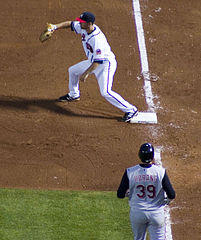Whether you've written one screenplay or a hundred, whether you prefer watching movies in a theatre or streaming at home, whether you've focused your career on writing for features or writing for TV, every screenwriter should concern themselves with the potential closure of a classic movie theater.
In Houston, the Landmark River Oaks (LRO) Theater has hosted screenings ranging from "Casablanca" to "Yellow Submarine" to "The Blair Witch Project". The theater has also hosted hundreds of midnight screenings, including the infamous "Rocky Horror Picture Show".
The theater's landlords have not offered the site a new lease and are threatening to shut it down at the end of March. When protesters gathered outside the theater to support the venue, the landlord posted signs that protesters would face prosecution as trespassers ... on a public sidewalk.
For more details, check out the full story.
As many communities across the country face (or have faced) the closure of beloved "art house" theaters, I thought I'd share this letter I sent to the Houston Mayor, the Houston City Council member in whose district the LRO resides, and the two top of executives of the LRO's property management company.
This issue doesn't just affect a neighborhood in Houston, Texas. It affects anyone who wants to get their story told on a screen, including screenwriters, directors, producers, actors, and crew members. As these venues die off, so do your opportunities to have an audience see your work.
This isn't just my fight. It isn't just Houston's fight.
It's a fight for all of us.
=======
pmanchi@weingarten.com, mayor@houstontx.gov, james.koski@houstontx.gov, districtC@houstontx.gov, Julia.Retta@houstontx.gov, landmark.theatres.publicity@gmail.com
Subject: Protect the River Oaks Theatre!
Dear Mayor Turner, Council Member Kamin, Mr. Alexander, Mr. Manchi, and to whom else it may concern:
I am writing to you today to ask for your help in maintaining an essential component of Houston's artistic and cultural history: the Landmark River Oaks Theatre (LRO).
As a long-time patron who has attended both first-run and revival screenings of some of the most important films in recent years, from "The Blair Witch Project" to "Yellow Submarine", I can speak first-hand about the importance of the LRO to the cultural and social community in a city largely deprived of such outlets.
As a screenwriter and aspiring filmmaker, I have also attended screenings of films made in Houston, by Houstonians, and for a Houston audience at LRO, which provides a venue for a vital part of Houston's filmmaking and artistic community.
As I'm sure you've all seen in recent weeks and months, Houston and Texas have suffered several "black eyes" in the national media, from the power outages attributed to the historic winter storm, to the Governor's rescinding of the mask mandates and other protective measures to prevent the spread of the Coronavirus, to the continuing exodus of the city's top professional athletes.
In the light of so many losses, powerful individuals such as yourselves must ask yourselves some uncomfortable questions:
- Can Houston really withstand the loss of one of its few remaining cultural icons?
- Will one more high-end retail outlet on a street full of them really make a long-lasting difference in a community starving for an outlet for cultural expression?
- Is the placement of another retail tenant in the same location worth all the bad press that tearing down the LRO would bring?
This crisis also forces public officials, such as Mayor Turner and Council Member Kamin, to answer some deep questions:
- Are you willing to stand with policies that seek to limit First Amendment rights, such as free speech, free access to public property, and the right to protest?
- Do you and the city value profits over people, as many critics suggest?
- If a valuable asset like LRO closes, how does that make Houston (and you) look to the rest of the nation?
If all of you feel that shutting down a cultural icon like LRO is best for both the city and the bottom line, there's nothing that we ordinary Houstonians (even one who's an award-winning screenwriter) can do to stop you.
If all of you place so little value, not only on the historical importance of such an asset, but also on the future value that won't appear in an investor's report, that such an asset can bring, we poor plebeians (who can't afford the lofty prices that the new tenant will bring) are powerless to stand in your way.
If all of you value dollars over diversity, commerce over community, and white-washed walls over multi-colored neon, then far be it from us mere mortals to stand in the way of such glorious "progress".
As we all know, the financial impacts from the Coronavirus have spread across numerous industries, and none quite as hard as the entertainment industry. This letter does not seek to deny these facts.
As we also know, if the impact of this year of isolation has taught us anything, some things are more important than money.
I know this.
You know this, Mayor Turner.
You know this, Council Member Kamin.
You know this, Mr. Alexander.
You know this, Mr. Manchi.
Now for another uncomfortable question:
What are we all going to do about it?
Numerous members of the Houston artistic community have written emails, launched protests, and raised awareness of the issue on both conventional and social media.
I've done some of what I can with this letter. If possible, I'll do what I can in person by joining the legal and public protests.
What are you going to do about it, Mayor Turner?
What are you going to do about it, Council Member Kamin?
What are you going to do about it, Mr. Alexander?
What are you going to do about it, Mr. Manchi?
Once this crisis has passed and the LRO reopens under a new lease, I hope to see all of you at a future screening.
Popcorn's on me.
Thank you.
Gerald Hanks
Council District C









_(5883489176).jpg/220px-St._Louis_Cardinals_third_baseman_David_Freese_(23)_(5883489176).jpg)
.jpg/196px-Josh_Harrison_playing_second_base_in_2017_(34985853622).jpg)

.jpg/320px-Noah_Syndergaard_(20697486276).jpg)








